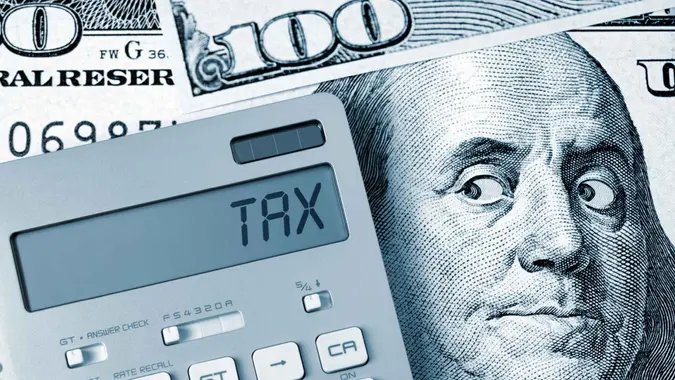Living in the 9 States With No Income Tax: Pros and Cons

Commitment to Our Readers
GOBankingRates' editorial team is committed to bringing you unbiased reviews and information. We use data-driven methodologies to evaluate financial products and services - our reviews and ratings are not influenced by advertisers. You can read more about our editorial guidelines and our products and services review methodology.

20 Years
Helping You Live Richer

Reviewed
by Experts

Trusted by
Millions of Readers
States collect income tax to pay for services such as education, medical care and public infrastructure. A large part of each state’s revenue comes from personal income tax as well as sales tax and business tax assessments.
Some states, however, don’t impose a state income tax. Instead, these states charge more in other taxes, such as sales tax, property tax rates and capital gains taxes. If you are looking to save on your tax returns to get a tax refund or even make money moves to earn some investment income, you’ll want to analyze all the ins and outs of your cost of living throughout the tax year.
Read: 3 Ways To Recession-Proof Your Retirement
States With No Income Tax
You might consider a move to one of these no-income-tax states if you cringe at the income tax rates deducted from your paycheck each month. But keep in mind that you’ll likely be paying more in sales and property taxes. Here’s all the information you need on which states have no income tax.
- Alaska
- Florida
- Nevada
- New Hampshire
- South Dakota
- Tennessee
- Texas
- Washington
- Wyoming
1. Alaska
Known for its stunning landscapes and vast wilderness, Alaska is one of the few states that doesn’t collect income tax from its residents. Instead, it relies on revenue from oil and other natural resources for its inflowing tax foundation. The majority of its revenue comes from exporting oil via the Trans-Alaska Pipeline System.
When oil prices are high and stable, Alaska receives a surplus of revenue, which it invests in the Alaska Permanent Fund. The fund consists of a diversified portfolio and citizens share in its earnings each year by completing a proof of residency application. With oil prices slumping in recent years, however, there’s been talk of introducing a state income tax.
2. Florida
Warm weather all year round, growing job prospects and no state income tax make Florida a popular destination for retirees and families alike. One of the perks of living in Florida is that there’s no state income tax, making it an attractive option for those looking to save money and make their retirement plans go further. Although the state has no income tax, it does charge a higher-than-average sales tax rate of 6%.
3. Nevada
Nevada also makes up for not collecting state income by charging a higher-than-average sales tax rate of 6.85%. With combined state and local taxes, residents of Clark County shell out 8.38% in sales tax. This rate is no bargain for locals, but because the state depends on tourism dollars, the tax keeps it solvent.
4. New Hampshire
Although New Hampshire does tax interest and dividends, it doesn’t collect income tax on regular earned income. This makes it an attractive option for those looking to save on their tax bill. Simply put, New Hampshire charges a 5% tax on interest and dividend income but does not charge income taxes on any resident’s W-2 wages.
5. South Dakota
Nestled in the Midwest, South Dakota is known for its friendly communities and wide-open spaces. Residents here enjoy the benefit of no state income tax, helping them keep more of their hard-earned money.
South Dakota is a sparsely populated state. If you live here, you don’t pay income tax and you pay a low sales tax rate of 4.5%. Job prospects aren’t great in South Dakota, however, and the minimum wage is a low $10.80.
6. Tennessee
Tennessee is known for its rich musical heritage and friendly locals. Residents here benefit from no state income tax, making it an affordable place to call home.
As of Jan. 1, 2021, Tennessee has completely repealed the state’s income tax — including the Hall tax, which charged a 1% tax on interest and dividend income. No taxes are collected on reported W-2 wages.
7. Texas
Everything is bigger in Texas, including the savings on income tax. Residents of the Lone Star State enjoy the absence of state income tax while still experiencing the state’s rich cultural heritage and booming economy.
Texas residents may pay no income tax but do have to deal with a 6.25% sales tax rate and property taxes that are among the highest in the nation. In addition, Texas’s minimum wage is only $7.25, so wages don’t provide much purchasing power even with the income tax break.
8. Washington
With no income tax to rely on, the state of Washington charges a higher sales tax to bring in revenue. At 6.5%, the state’s tax rate is among the highest in the nation. Washington does enjoy a minimum wage of $15.74 per hour which makes a big difference for the average earned income.
9. Wyoming
Wyoming doesn’t have a personal income tax or a business income tax, which makes it a business-friendly state. In addition, sales tax is a reasonable 4%. A large energy producer, Wyoming collects oil production taxes to offset its lack of state income tax.
Quick Take: Pros and Cons of Tax-Free States
Living in a tax-free state might be attractive to many Americans residing in a state with high-income taxes. Nothing is free, however — states still have to collect enough revenue to fund services and infrastructure.
If you aren’t paying income tax, you’re likely paying more in other areas like sales or property taxes. In addition, low wages and few job prospects might make living in a no-income-tax state unaffordable even with this generous tax break. Here are some key takeaways:
- Every U.S. citizen is responsible for paying federal income tax, and some taxpayers also must pay a separate state income tax.
- As of 2024, just nine states don’t impose any additional income tax: Alaska, Florida, Nevada, New Hampshire, South Dakota, Tennessee, Texas, Washington and Wyoming.
- At first glance, it might seem as if there’s no reason to live in a state with income tax, as it simply adds a financial burden to your budget. But there are both pros and cons to living in a state with certain tax advantages.
| Federal Taxes |
|---|
| Pro: You’ll only have to pay federal income taxes.
How this benefits you: The top federal income tax bracket is 37%. If you find yourself in that bracket, you’ll already be forking over a significant amount of your income to the federal government. Adding state income tax on top of that, especially in a high-tax state like California, can push your total income tax bill to over 50%. Rates like that are enough to push some high earners away from high-tax states like California to no-tax states like Texas. |
| Con: Other taxes may be higher.
How this negatively impacts you: This translates to higher sales taxes, property taxes and/or gasoline taxes. For example, homeowners in New Hampshire and Texas pay some of the highest property taxes in the country, at 1.89% and 1.6%. Washington charges the third-highest gasoline taxes in the country, at 49.4 cents per gallon. |
| Cost of Living |
|---|
| Pro: Retirement benefits for cost of living.
How this benefits you: Avoiding additional taxes, especially on a fixed income, can help make your retirement savings go further. FICA taxes, for example, may be used for healthcare expenses in retirement, by funding Social Security. |
| Con: Lower infrastructure and education spending.
How this negatively impacts you: In some cases, having no state income tax does translate to lower revenue for individual states. In turn, this may result in lower state spending on basic services. Other states with no income tax revenue may lower spending in other areas, such as infrastructure. |
Final Take To GO: Is It Better To Live in a State With No Income Tax?
At the end of the day, whether or not it’s better to live in a state with no income tax depends in part on your personal financial situation — but there are other considerations as well. For example, quality of life and the lifestyle you choose to live are also important. From a strictly financial standpoint, it’s important to remember that the amount you earn plays a large role in your tax situation.
For example, if you’re a single taxpayer living in California and earning $1 million per year, for example, tax rates reach a whopping 13.3%. However, if you earn a low-to-moderate wage, tax rates are not that onerous, even in California. As with any financial question, there’s no black-and-white answer to whether it’s preferential to live in a state with no income tax, as several personal factors come into play.
Allen Young contributed to the reporting for this article.
 Written by
Written by  Edited by
Edited by 


























